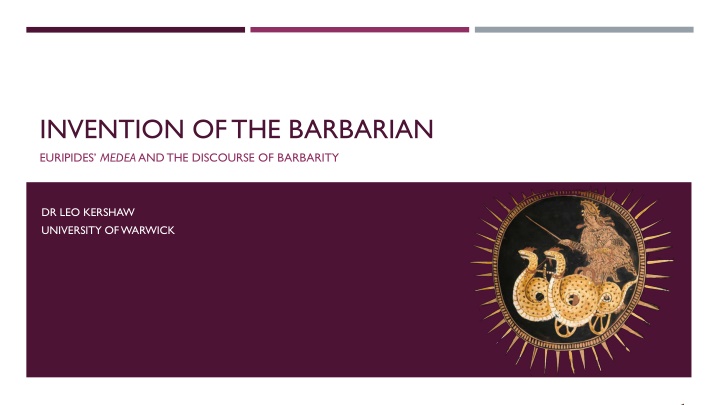
Discourse of Barbarity in Euripides' Medea and the Radical Reimagining of Gender and Culture
Explore the powerful portrayal of barbarity in Euripides' Medea and its profound impact on challenging traditional beliefs surrounding gender, politics, and culture in Athenian society. Through the lens of the barbarian character, Medea, this play delves into themes of justice, dignity, and the complex interplay of foreignness and otherness. Uncover how Medea's narrative redefines notions of barbarism and subverts established norms with a radical perspective that resonates through the ages.
Download Presentation

Please find below an Image/Link to download the presentation.
The content on the website is provided AS IS for your information and personal use only. It may not be sold, licensed, or shared on other websites without obtaining consent from the author. If you encounter any issues during the download, it is possible that the publisher has removed the file from their server.
You are allowed to download the files provided on this website for personal or commercial use, subject to the condition that they are used lawfully. All files are the property of their respective owners.
The content on the website is provided AS IS for your information and personal use only. It may not be sold, licensed, or shared on other websites without obtaining consent from the author.
E N D
Presentation Transcript
INVENTION OF THE BARBARIAN EURIPIDES MEDEAAND THE DISCOURSE OF BARBARITY DR LEO KERSHAW UNIVERSITY OF WARWICK
IT IS A PLAY ABOUT THE BARBARIANS POWERFUL ABILITY TO RESTORE HER OWN DIGNITY AND ACHIEVE JUSTICE, AND IT IS A RADICAL PLAY BECAUSE IT UPROOTS TRADITIONAL BELIEFS RELATED TO GENDER, POLITICS AND CULTURE WHICH LAY AT THE HEART OF ATHENIAN SOCIETY OF THE FIFTH CENTURY BCE. OLGA KEKIS MEDEA ADAPTED: THE SUBALTERN BARBARIAN SPEAKS. (2019: 89)
HERODOTUS 7.62 The Medes were formerly called by everyone Arians, but when the Colchian woman Medea came from Athens to the Arians, they changed their name, like the Persians [after Perses]. This is the Medes own account of themselves. , . . Cf. Pausanias 2.3.8, Apollodorus i.9.28, Diodorus Siculus 4.40 58
MEDEA THE BARBARIAN? Edith Hall, Inventing the Barbarian(1989: 2): the poets created a whole new discourse of barbarism , [ ] a complex system of signifiers denoting the ethnically, psychologically, and politically other . Homer, Iliad 11.739 741: the spearman Moulios; he was son-in-law to Augeias, and had his eldest daughter, blonde Agamede as wife, who knew as many medicines as the wide earth nourishes. , , . Denys Page, Euripides Medea(1938: xxi): Because she was a foreigner she could kill her children: because she was a witch she could escape in a magic chariot. She embodies the qualities which the fifth century Athenian believed to be oriental. Page (1938: xvii): here it is important to understand that the poet has described not a Greek woman but a barbarian. Though her emotions are natural to all women of all times in her position, their expression and the dreadful end to which they lead are everywhere affected by her foreign origin.
THE DISCOURSE OF BARBARITY Barbaros is only used 4 times in Medea never by the chorus, Creon, Aigeus, the nurse, tutor, or messenger only by Jason (x2) and Medea herself (x2). Helen Bacon, Barbarians in Greek Tragedy (1955: 5): three main meanings of barbaros in tragedy: unintelligible foreign, non-Greek (nationality) foreign, with some implication of inferiority (uncivilised)
BARBAROS1: EURIPIDES MEDEA, 252-258 But your story and mine are not the same: : you have this city and your father s house and life s delights and company of friends, , but I, deserted, city-less, am maltreated by my husband, plundered from a barbarian land, , , and have no mother, no brother, no relative , , to provide refuge from this calamity. .
BARBAROS2: EURIPIDES MEDEA, 534-541 But in return for saving me you got more than you gave, as I will prove. , . First, in a Greek land rather than a barbarian country you now live, and you know justice and heed the law, with no concession to force. : All the Greeks recognise that you are clever and you have a reputation; if you were living : on the world s outskirts, there would be no talk of you. , . Olga Kekis: Jason is the arrogant coloniser that embodies two related attitudes: metropolitan arrogance and a male chauvinistic contempt for, even fear of women ( Medea adapted: The subaltern barbarian speaks , 2019: 92)
BARBAROS3: EURIPIDES MEDEA, 591-592 But a barbarian marriage-bed in your old age was not reputable for you. .
BARBAROS4: EURIPIDES MEDEA, 1323-1341 Detestable creature, most hateful woman to gods and me and the whole human race, who dared plunge the sword into the children you birthed and destroyed me, leaving me childless! [ ] I m in my senses now then I was not when from your house in a barbarian land I brought you to a Greek home, a great evil [ ] There is no Greek woman who would have ever dared do this, instead of whom I decided to marry you, a hateful and destructive match for me. , , . [ ] , , , [ ] , ,
INFANTICIDE: A BARBARIAN PHENOMENON? I know one, just one woman of all in existence, who put her hand to her own children, , Ino, maddened by gods, when the wife of Zeus , sent her roaming from home; : the wretch fell into the salty sea with the impious murder of her children, , , extending her foot over the sea s edge, . she perished, dying with her two children. Euripides Medea, 1289-1289
BARBARITY IN EURIPIDES Euripides, Iphigeneia in Tauris 1174: Apollo! Not even among the barbarians would anyone have dared this. ( , .) Medea s savage nature ( , 1343) Suzanne Sa d: this anti-Barbarian talk, whose spokesmen are very suspect, is always invalidated by the context ( Greeks and Barbarians in Euripides Tragedies: The End of Differences? , 2001: 85). Bernard Knox: there is no suggestion in the play that anyone regards Medea as a barbarian, except, of course, in the end, Jason (Word and Action, 1986: 310).
BARBARITY IN AESCHYLUS PERSIANS Barbaros is used 10 times in Persians: earth, the barbarian earth 187: , 255: for the whole army of barbarians perished 337 338: / the fleet / of the barbarians 391: and fear came upon all the barbarians 423: barbarian army 434: the whole race of barbarians 475: barbarians whom Marathon destroyed before 635: barbarian incoherence 798: the whole army of barbarians 844: hearing the barbarians calamities
AESCHYLUS PERSIANS, 181-186 I dreamt that two beautifully-clad women, , one dressed in Persian peploi, , the other in Dorian attire, came into sight, , , [ ] [ ] and they dwelled in [two] fatherlands, one was allotted Greece, the other, barbarian land. , .
BARBARITY IN EURIPIDES TRAGEDIES Euripides uses the word barbaros 100 times in his surviving 18 tragedies. Aeschylus uses barbaros 14 times (across 7 plays). Sophocles uses barbaros 7 times (across 7 plays). Barbaros count 25 20 15 10 5 0
BARBARIC BEHAVIOUR? Barbarian stereotypes: orientalism, effeminacy, luxury, softness, megalomania, hubris, savage cruelty, a fierce temper. Denys Page: She has nearly all the features of the type unrestrained excess in lamentation, a readiness to fawn upon authority, the powers of magic, childish surprise at falsehood and broken promises, [ ] the inhuman cruelty of the child-murderess was a typically foreign quality (Euripides Medea,1938: xix xx). The Carians in Iliad 2.867 are , of foreign speech . Aeschylus Persians describe their obscure barbaric speech ( , 635). Pat Easterling: If Medea is to be seen as a distinctly oriental type, why does Euripides make her talk like a Greek, argue like a Greek, and to all appearances feel like a Greek? ( The infanticide in Euripides Medea , 1977: 180)
MEDEAS APPEARANCE RED-FIGURE LUCANIAN CALYX-KRATER, C.400 BCE, SIDE A (CLEVELAND ART MUSEUM 1991.1)
MEDEAS HELLENISATION Medea s barbaric excessive lamentation, childishness, cruelty, and murderous tendencies are also seen in Ajax, Odysseus, Achilles, and Herakles the figureheads of Greek heroism! She shows many traits of a Greek hero: hubris, a strong will and fierce temper, a penchant for revenge, a concern for her kleos, and a fear of being laughed at. She uses the language of honour, respect, and justice: ill-fortuned Medea, dishonoured ( , 20). you were not about to dishonour ( ) my marriage bed and live out a pleasant life laughingat me ( , 1354-5) if I am caught sneaking into the house and plotting [its destruction], I will be killed, giving laughterto my enemies ( , 381-3). Let no one think of me as feeble and weak, not peaceful, but the very opposite: a grave threat to my enemies, and kindly towards my friends: such are the qualities of a mostgloriouslife ( / , , / / (807-11).
HE MIGHT HAVE MADE MEDEA A CLYTEMNESTRA FIGURE A MAGNIFICENT CRIMINAL WHOSE VIOLENCE REPRESENTS THE PRIMITIVE PAST OF THE RACE, POSED AGAINST THE CIVILIZED, RATIONAL VALUES OF MALE DEMOCRACY, REPRESENTED IN THIS CASE BY JASON. [ ] BUT HE DID NONE OF THESE THINGS: WHAT HE DID WAS, LIKE THE ENDINGS OF SO MANY OF HIS PLAYS, UNEXPECTED. BERNARD KNOX WORD AND ACTION (1986: 273)
WHILE HER OPPONENTS PERCEIVE MEDEA AS A THREATENING BARBARIAN PRESENCE, MEDEA S OWN CONCEPTION OF HERSELF IS ESSENTIALLY HEROIC AND STRIKINGLY GREEK . [ ] THUS, AS A FOREIGN WOMAN BEHAVING LIKE A GREEK MAN, MEDEA S SELF- CONCEPTION CUTS ACROSS THE POLARITIES OF BOTH GENDER AND ETHNICITY. BILL ALLAN EURIPIDES MEDEA (2002: 74 75)
BARBARIAN MEDEAS OF THE 19TH CENTURY From at least the latter half of the 19th century, representations of Greeks and barbarians were shaped by theories of evolution. Robert Brough s Medea; or, the best of mothers, with a brute of a husband (1856): Medea: The fact is, I m the daughter of a nation / A little backward in civilization. (1.1.201 202) Jason: Twasn t a happy match I couldn t tame her. (1.1.276 277) Ideas of Medea s barbarity in the 19th and 20th century were informed by colonialism and scientific racism.
GILBERT MURRAYS MEDEA Translation published in 1906. The first to include Medea s first speech to the Corinthian women in full. Informed by contemporary liberal politics, including women s suffrage and international politics. Murray believed that Euripides shared many of his own socio-political sentiments: rational, liberal, humane, feminist Murray to actress Sibyl Thorndike Murray to Thorndike (30 June 1941) Your symbolic interpretation of it is extremely interesting, and it never occurred to me before Jason as civilisation and Medea as the wild forces savagely rebelling against it because it has done its work so badly.
GILBERT MURRAYS MEDEA Oh, wild words! Did ye hear her cry [ ]? [ ]; (168) Tigress, not woman, beast of wilder breath Than Skylla shrieking o er the Tuscan sea. , , (1342 3) In sheer savageness of mood Thou drivest from thee every friend. (621 622) , (303) A wise-woman I am; and for that sin To divers ill names men would pen me in; A seed of strife; an eastern dreamer
GILBERT MURRAYS MEDEA Thine old barbarian bride, The dog out of the east who loved thee sore, She grew grey-haired, she served thy pride no more. (591 2) I hear a voice and a moan, A voice of the eastern seas , (131 132) from savagery Of eastern chambers, from a cruel land (1330) I sought to rear Our sons in nurture worthy of my race (562)
MEDEA AS AN IMMIGRANT, 1113 At first she had an irreproachable life with husband and kids, an immigrant pleasing , to the citizens to whose land she had come
MEDEA AS PHUGAS 11 12: / 272 273: / 400: 438: 454: 462 463: / 554: 610 611: / 706: 938: 967 968: 1002: 1024: 1124: ; 1155: 1295: ; an immigrant pleasing to the citizens leave this land as an exile my exile from the land an exile from this country consider your punishment of exile a benefit exile brings with it many troubles exile that I am an aid to you in your exile Creon drives me from the land, an exile we are being removed from this land in exile the exile of my children these boys have been spared exile I go as a refugee what is worthy of my flight? spare from exile has she fled in exile?
MEDEA AS MIGRANT Edith Hall: Euripides prefers to test the validity of the conventional polarisation of Greek and barbarian ( Black Sea Back Story: Euripides Medea , 2019: 287). Rebecca Futo Kennedy: Medea brings temporary benefits to the city where she resides, so long as she is contained within proper metic spaces , which, by the end, she transgresses (Immigrant Women in Athens, 2014: 49). Aigeus promises to act as Medea s host and protector ( ); the chorus describe her as being in need of . Medea articulates her need for a land of refuge, .
TO READ THE TRAGEDY AS A DAY IN THE LIFE OF A PHUGASIS THEREFORE TO ANIMATE A CRITICAL EXPLORATION OF HOW DISLOCATION FROM THE GENDER- STRUCTURED FAMILY PRODUCES PHYSICAL DISPLACEMENT AND A NEED FOR ASYLUM DEMETRA KASIMIS MEDEA THE REFUGEE (2020: 394)
BIBLIOGRAPHY Allan, William. 2002. Euripides: Medea. London. Bacon, Helen H. 1955. Barbarians in Greek Tragedy. New Haven. Easterling, Pat. 1977. The infanticide in Euripides' Medea. Yale Classical Studies 25: Greek Tragedy: 177 191. Friedrich, Rainer. 1993. Medea apolis: on Euripides dramatization of the crisis of the polis. In Sommerstein, Alan H., ed. Tragedy, Comedy and the Polis. Bari: 219 239. Futo-Kennedy, Rebecca. 2014. Immigrant women in Athens: gender, ethnicity, and citizenship in the classical city. New York. Hall, Edith. 2019. Black Sea Back Story: Euripides Medea. In Braund, David; Hall, Edith and Wyles, Rosie, eds. Ancient Theatre and Performance Culture Around the Black Sea. Cambridge: 267 288. Hall, Edith. 1989. Inventing the Barbarian. Greek Self-Definition through Tragedy. Oxford. Hall, Jonathan M. 2002. The Barbarian Enters the Stage. Hellenicity: Between Ethnicity and Culture. Chicago: 172 189, esp.175 178. Kasimis, Demetra. 2020. Medea the Refugee. The Review of Politics. Vol. 82(3): 393 415. Kekis, Olga. 2019. Medea adapted: The subaltern barbarian speaks. Hypertheatre: Contemporary Radical Adaptation of Greek Tragedy. London: 88 140, esp. 88 92. Knox, Bernard. 1986. Word and Action: Essays on the Ancient Theater. Baltimore/London. Murray, Gilbert. 1913. Euripides and his Age. London. Page, Denys. 1938. Euripides Medea. Oxford. Sa d, Suzanne. 2001. Greeks and Barbarians in Euripides Tragedies: The End of Differences? In Harrison, Thomas, ed. Greeks and Barbarians. Edinburgh: 62 100. Taplin, Oliver. 2007. Pots and Plays: interactions between tragedy and Greek vase-painting of the fourth century B.C. Los Angeles.






















